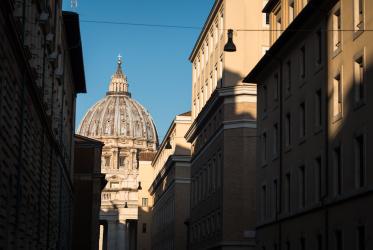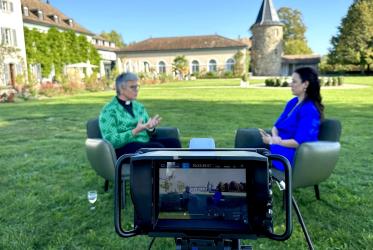by Msgr John A. Radano, Pontifical Council for Promoting Christian Unity
In 2001 unlike most years, Christians of East and West celebrate Easter on the same date. Sadly, this is an exception, reminding us that Christians are divided on many issues, even on the date for celebrating this central Christian mystery.
Christians have struggled from early times with the question of establishing a common date for celebrating Easter. The issue was addressed again in the twentieth century, and especially during the last three decades. Christian hopes for a common date are motivated primarily by theological concerns. A common date, said a World Council of Churches (WCC) consultation in 1970, "would ... remove an obstacle which obscures the unity of Christians and it would provide a new framework for common witness to the Risen Lord" (The Ecumenical Review, April, 1971, 177).
Particularly since the Second Vatican Council the Catholic Church has expressed deep interest in establishing a common date for Easter. The Council encouraged seeking a fixed date if there was ecumenical agreement to do so (cf. Appendix to Constitution on the Sacred Liturgy, 1963). Until that could be achieved, the Decree on Eastern Catholic Churches, as an interim approach, authorized Patriarchs or authorities of a given place to seek unanimous agreement, after ascertaining the views of all concerned, on a single Sunday for observing Easter.
After Vatican II, this hope was raised in correspondence between Pope Paul VI and the Ecumenical Patriarchate, and in the Joint Working Group between the Catholic Church and the WCC. The Pope's letter to the Ecumenical Patriarch Dimitrios I (March 26, 1975) indicates the evangelical purpose of seeking a common date:
The world in which we live has perhaps a greater need than ever that we should testify ... to our faith in the Resurrection of Jesus Christ, Our Lord. Moreover, his Resurrection is the foundation of our faith - this faith that is called in question by many. Did not St Paul write that if Christ be not risen our faith is vain (1 Cor 15:14)? Moved by this conviction, and trusting in the power of the Risen Christ and his Spirit, we express our hope that by celebrating the mystery of mysteries with a single heart and voice, we may be able to render glory to God, the Father of Our Lord Jesus Christ, who raised Him from the dead (Rom 16:6; Col 2:12).
A specific proposal was made in an ecumenically sensitive way in 1975 by the Catholic Church in coordination with the WCC. On behalf of the Pope Paul VI, Cardinal Willebrands, president of the Secretariat (since 1988 Pontifical Council) for Promoting Christian Unity, proposed in a letter to Patriarch Dimitrios I (18 May 1975) and other Orthodox leaders, with letters of similar contents sent to WCC general secretary Dr Philip Potter and to leaders of world confessional bodies, that from 1977 (a year in which all Christians would celebrate Easter on the same day) onwards, "Easter should always be celebrated on the Sunday following the second Saturday of April". As part of its preparation for its 1975 assembly in Nairobi, the WCC was also surveying its member churches on the same question. As a result of its survey the WCC concluded that "at this stage, a specific proposal would not lead to a date uniting all Christians in the celebration of Easter on the same day". It therefore became clear that it was not possible to go further on the proposal at this point. Since the Catholic Church did not want to take a decision that would create another obstacle to unity, its plan was not put into effect.
Another proposal for seeking a common date for celebrating Easter has emerged as a result of a consultation co-sponsored by the World Council for Churches and the Middle East Council of Churches in Aleppo, Syria in 1997. The Aleppo plan proposes a common, though movable, date for Easter, different from the fixed date suggested in 1975. Edward Cardinal Cassidy, then president of the Pontifical Council for Promoting Christian Unity, expressed in 1997 his support for studying this proposal, and gave an initial affirmative reaction to it.
Like Paul VI, Pope John Paul II expressed support for a common date of Easter. John Paul II's witness to the Gospel highlights Redemption in Christ, as reflected in some of his encyclical titles: Redemptoris hominis (1979), Redemptoris Mater (1987), and Redemptoris Missio (1990). For him celebrating the Redemption has implications for ecumenism, because "we go beyond historical misunderstandings and contingent controversies, in order to meet each other on the common ground of our being Christian, that is Redeemed. The Redemption unites all of us in the one love of Christ, crucified and risen." (December 23, 1982)
The Pope has tried to foster common witness to the redemptive mysteries of Christ, crucified and risen. Thus, since 1994, John Paul has invited Orthodox or Protestant leaders on several occasions, to write the meditations for the Way of the Cross which he leads on Good Friday each year at the Roman Colosseum. Recently, noting that in 2001 all Christians celebrate Christ's resurrection on the same date, he expressed the hope that "this should encourage us to reach agreement on a common date for this feast." (Homily, January 25, 2001)
Celebrating Easter on the same date in 2001, is a grace. It is the hope of the Catholic Church that Christians find a way to do this annually. May we, his disciples, use this opportunity of contemplating the Resurrection of the Redeemer together this year to beg his forgiveness and mercy for our separation, and to entreat his help in taking steps towards the unity for which he prayed (Cf. Jn 17:21).
In early 2001, the WCC Public Information Team asked knowledgeable representatives of the Orthodox, Roman Catholic and Protestant traditions to give a brief outline of their thinking on a common date for Easter. Monsignor John A. Radano of the Pontifical Council for Promoting Christian Unity wrote about "Catholic hopes of a common date for Easter".




